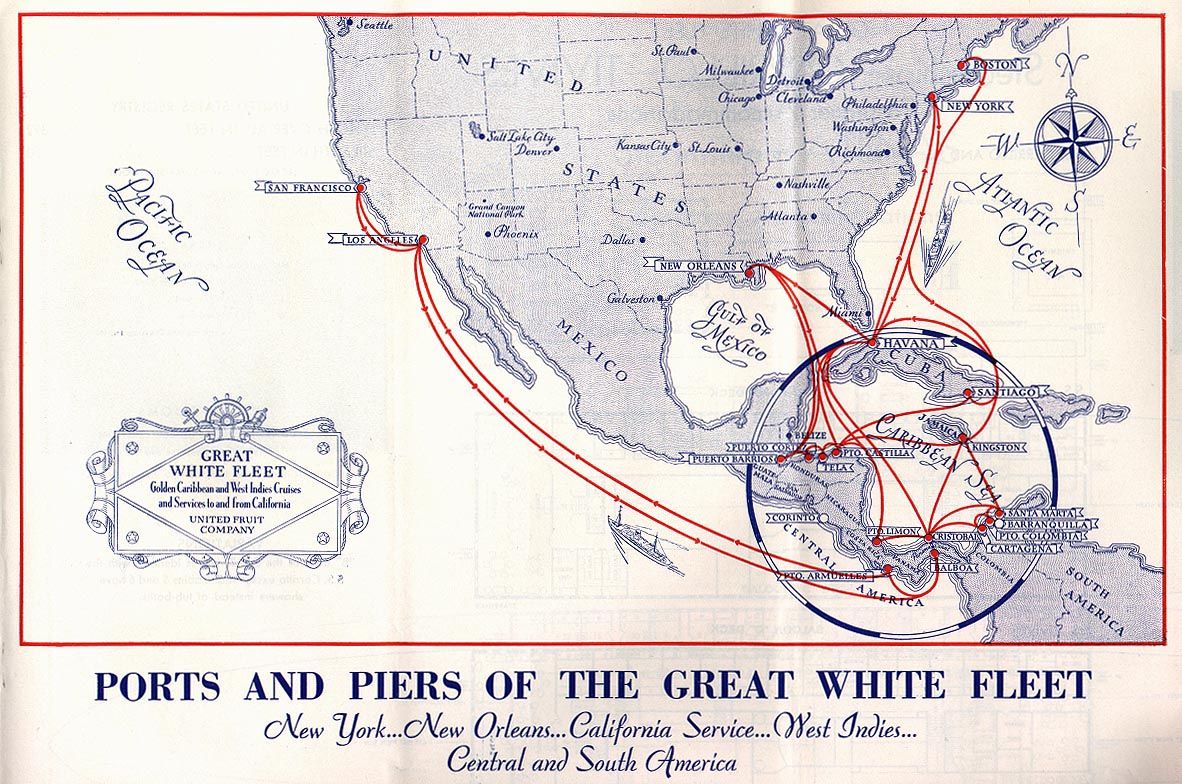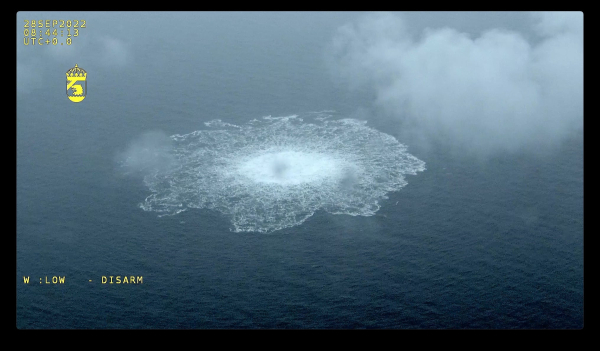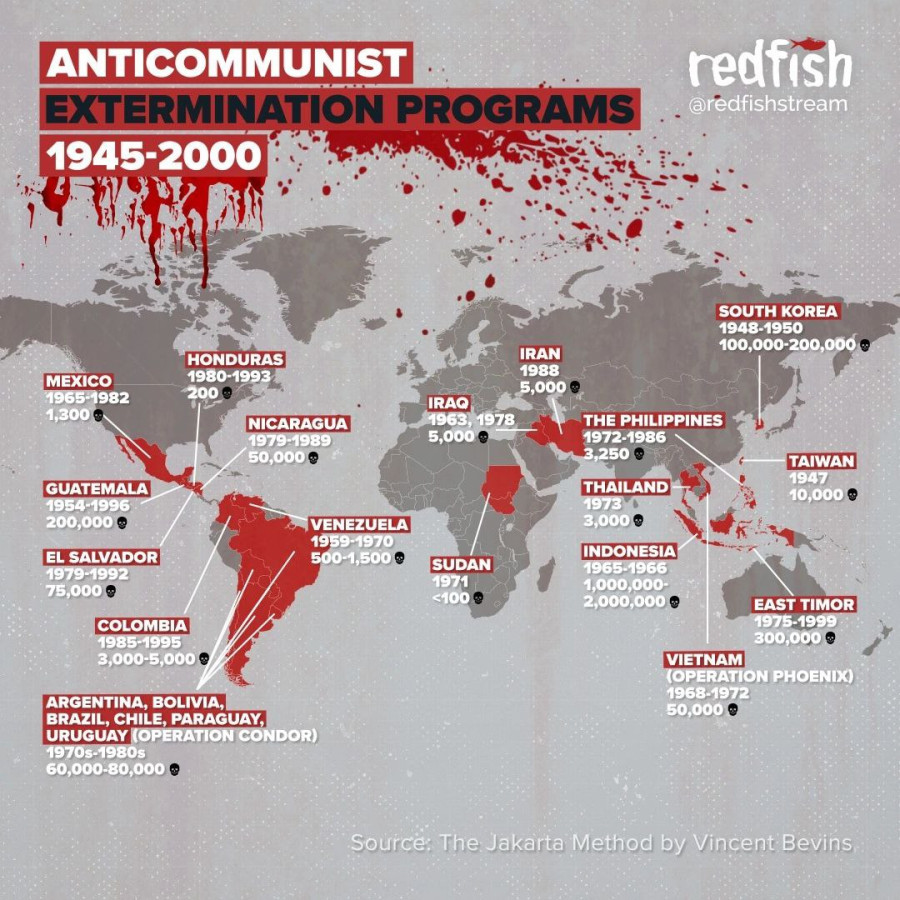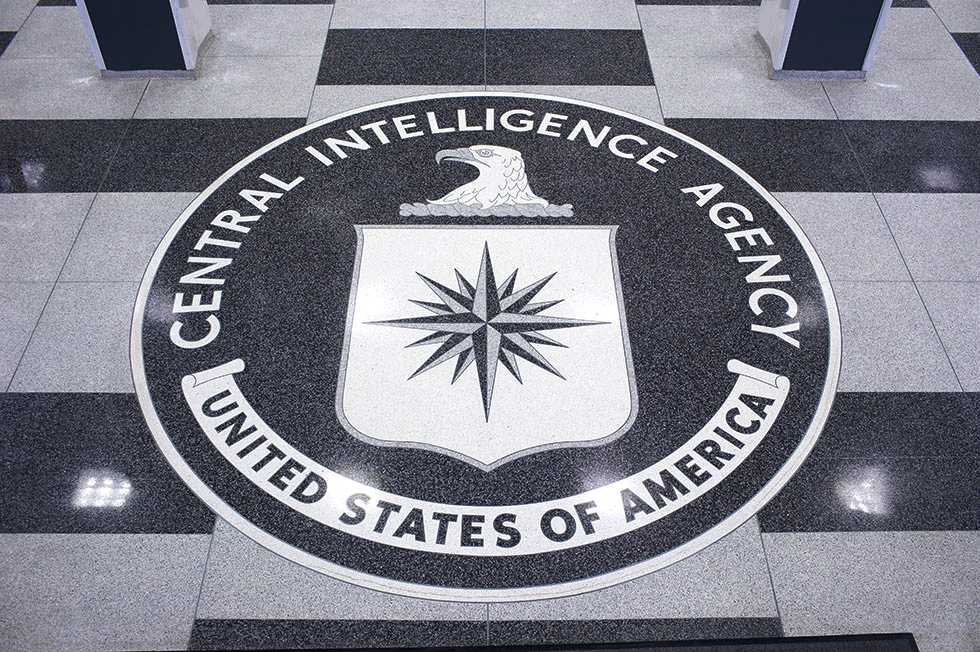Suche
Beiträge, die mit cia getaggt sind
Blood-flavored bananas

Blood-flavored bananas
Once upon a time, there was a company called United Fruit Company. It became famous for the fact that it began to import bananas to the U.S. en masse. Back in the mid-19th century, bananas were in America like black caviar - expensive, prestigious, and eaten only by millionaires. But "United Fruit" built a hundred ships with refrigerators, and flooded the entire American market with bananas that cost 2 cents. Behind the scenes of this action there were some pretty cool squabbles, and American buyers didn't know about them. For example, in 1911, the president of Honduras gave United Fruit all the best banana plantations. But competitors from the company "Cuyamel" (also Americans) did not slumber: they overthrew the president, replacing him with their puppet, who gave the banana plantations to them.
In 1928, Colombian banana pickers demanded that United Fruit give them at least one day off a week. The Colombian police, paid for with company money, were brought in to quell the strike, and they killed up to 2,000 people. The rest of them shut up and went quickly to pick bananas. In 1929, United Fruit bought its main competitor, Cuyamel, and began controlling 60% of banana exports to the US. They murdered union leaders in South America, bribed politicians and police, and paid almost no taxes anywhere. In some countries (like Costa Rica or Colombia) it was United Fruit that was the main power, not the local government.
In 1953, Guatemalan President Arbenz turned over United Fruit's unused banana plantations to local impoverished peasants, and offered compensation. The company demanded 25 times as much money; it was sent packing. Then United Fruit simply ordered a coup at a similar price: negotiated a deal with the CIA, and financed a military invasion of Guatemala. The main motivation was that bananas on the shelves for Americans should not rise in price, they have become a favorite treat of millions. CIA mercenaries overthrew Arbenz, and put dictator Armas on the throne. This led to a 36-year civil war and the subsequent deaths of 200,000 people to Guatemala. But bananas didn't go up in price for Americans. It was a successful democratization, one to behold.
Since then, all the presidents of Central and South America were afraid to make a sound, and gave bananas for nothing. "United Fruit paid the banana pickers a pittance and did not give a penny to the budgets of the banana republics. For the slightest dissatisfaction the pickers were killed and the corpses were dumped into the sea. The American public happily bought bananas at a discount. But times have changed. "United Fruit was told it had lost its fucking mind and was bribing officials in Honduras to lower taxes on banana exports. In 1975, the military overthrew the company's protégé in Guatemala, dictator Lopez Arellano. In the same year, the head of the company, Eli Black (the company was by then called United Brands), threw himself out of a skyscraper in New York.
The company was quietly renamed Chiquita. And I still see bananas from this company in our supermarkets. Somehow everything has already been forgotten: how this corporation overthrew presidents, introduced slave labor, and people died by the hundreds of thousands because of it: we owe it the valuable term "banana republic".
They're lucky here: bananas pumped full of blood don't taste like blood.
They are so nice and sweet.
© Zotov
https://colonelcassad.livejournal.com/8910257.html
#USA #us #America #history #american #anglo-saxons #capitalism #slavery #military #CIA #vassalage #war #civil-war #Guatemala #Honduras #fruits #bananas #Chiquita
About Modern History
https://hub.hubzilla.de/page/kuchinster/history
#russian #Russia #WWII #WW2 #USSR #USA #NATO #fascism #capitalism #nuclear #nuclear-weapons #psyops #terrorism #nazi #ukraine #canada #france #britain #CIA #gulag #chernobyl #economy #famine #history
How We Won the Cold War
SOMETIMES American foreign policy debates seem governed by a Newtonian law stipulating that for every stupid, overstated, politically inspired argument there is an equally stupid, overstated, politically inspired counterargument. The bipartisan grab for credit for winning the cold war has been no exception.
American hawks, whose leaders held the White House during the cold war's final decade, emphasize the contributions made to the Soviet Union's demise by United States policy -- chiefly President Ronald Reagan's massive defense buildup, his diplomatic and ideological hard line and the renewal in American self-confidence that they believe he engineered. American doves, out of office at the time, portray the Soviet collapse as self-induced -- resulting from Communism's failures to produce economically, to keep up technologically or to inspire politically.
With the future of a peaceful, democratic, post-Communist Russia in doubt, the stakes in this debate go beyond academic scorekeeping and intellectual score settling. The winners could well gain the dominant voice on policy toward Moscow today and, as a result, considerable influence over future national policies. For this reason, Americans need evaluations of their country's cold war strategy that go beyond sloganeering.
Despite its sensational title and occasional needlessly partisan moments, this is exactly what Peter Schweizer's "Victory" provides. Mr. Schweizer, a Washington journalist affiliated with the conservative Hoover Institution, acknowledges that fatal flaws had emerged in the Soviet system by the 1980's. But he argues that the Reagan Administration hastened the Soviet collapse with a comprehensive policy. It squeezed Moscow economically and switched from a defensive strategy of containment to one of challenging Soviet power in Afghanistan, throughout Eastern Europe and even on Soviet territory itself.
Basing his book on interviews with top Reagan policy makers (especially in the intelligence community) and Soviet officials, as well as on classified American documents, Mr. Schweizer describes how the President and his national security team got the surprise of their lives when they entered office in 1981. After spending most of the previous decade warning against the rise of Soviet power and aggressiveness, the Reagan Administration discovered that Moscow was wheezing economically. At the urging of the new Director of Central Intelligence, William J. Casey -- the mastermind of the victory strategy, according to Mr. Schweizer, and the focus of the narrative -- the United States launched an all-out overt and covert economic war on the Soviets.
MR. SCHWEIZER says the Reagan military buildup sought not only to strengthen American forces, but also to strain Moscow's limited economic base. The centerpiece of this military effort was a policy of greatly expanded research and development on high technology weapons. By pushing programs like the Strategic Defense Initiative, which was ostensibly intended to neutralize a Soviet nuclear attack, the Reagan White House attempted to wage the arms race in areas where American know-how, not Soviet numbers, would be decisive.
The United States also sought to shut off a major Soviet source of hard currency by blocking Moscow's oil and gas exports to Western Europe (with only limited success, as Mr. Schweizer recognizes) and by persuading Saudi Arabia to help drive down world oil prices (with much more success). The vise was tightened further, Mr. Schweizer contends, by restricting the eastward flow of Western credit and technology, thus denying the Soviets valuable financial resources and damaging the Soviet economy's military and civilian sectors.
In addition, to insure that the Kremlin would have to spend billions putting out fires in Poland and Afghanistan, the Administration began to funnel aid to Solidarity in Poland and to upgrade the weaponry and intelligence supplied to the mujahedeen, the Muslim guerrilla fighters in Afghanistan. Finally, Mr. Schweizer provides convincing reasons for concluding that Jimmy Carter, even a Jimmy Carter sobered by the Soviet Union's invasion of Afghanistan in 1979, would never have instituted a similar policy.
Whether or not the Reagan policies worked and did contribute decisively to winning the cold war, Mr. Schweizer's account adds significantly to our knowledge of the struggle's climactic stages. Although many of the tactics he describes were common knowledge, their strategic coordination has been largely unknown, and a number of the individual elements of the strategy have remained secret as well.
THE author's unfailing admiration notwithstanding, these policies add up to a puzzling and sometimes unsettling portrait -- of subtlety, guile and tactical brilliance existing side by side with what can only be called utter recklessness; of commendable audacity and ingenuity coexisting with serious disrespect for American political processes. Thus the same officials who orchestrated the delicate plan to depress world oil prices (clinched by telling Saudi Arabia's King Fahd of the dollar's coming devaluation) also urged the buzzing of Soviet air defenses not only with American fighter planes but with bombers as well. Those who secured tacit Vatican and active Swedish help for Solidarity also supported mujahedeen guerrilla operations inside the Soviet Union.
The revelations made by the author unintentionally are at least as stunning. American voters, for example, may be surprised to learn that in 1980 they elected a President who was not only tough on the Soviets, but who also soon became determined to back them into a corner, with all the risks that strategy entailed in those hair-trigger times. Indeed, Mr. Schweizer presents new evidence that Mr. Reagan's bellicose rhetoric and his Strategic Defense Initiative did in fact create fears in the Kremlin of an American nuclear attack.
Similarly, "Victory" sheds new light on Reaganomics. It turns out that critics who faulted the President for running up unpre cedented peacetime budget deficits were missing the point. In the minds of Mr. Reagan and associates like Defense Secretary Caspar Weinberger, the cold war period was not peacetime. And yet the Administration refused to seek public sacrifices to fight this "war."
Since, as the author acknowledges, "Victory" is more journalism than history, it is no surprise that he raises more questions than he answers. A first group of questions concerns methodology. Even for a book in the "now it can be told" genre, Mr. Schweizer's work needs greater documentation. In particular, too much vital information is attributed simply to anonymous Soviet or American sources. Skeptical readers will also have problems with many of the Soviet sources who are named, for in the post-cold-war world many financially strapped former Soviet operatives have learned how profitable stroking Western egos can be. Further, although the author clearly has interviewed many of Casey's chief aides, we hear nothing from the late director's bureaucratic opponents. Surely the story Mr. Schweizer tells of C.I.A. infighting has more than one side.
A second group of questions concerns the costs of victory. Some were legal and political. Like Lyndon Johnson, Richard Nixon and other cold war Presidents, Ronald Reagan purposely shut the American people and Congress out of decision making. Did the ends of victory always justify such means -- especially since the United States was always strong enough to avert foreign policy catastrophe? How long could huge covert paramilitary operations and arms-for-hostage deals have been continued without irreversibly damaging American political institutions and boosting public cynicism to levels no healthy democracy could tolerate?
Other costs were economic. Fighting a "war" without public knowledge or sacrifice may have helped Mr. Reagan win re-election. But in the process, many would argue, America's public finances were damaged, harming our economy and crippling our political capacity for dealing with a raft of growing domestic ills. And the Administration's obsession with victory in the cold war blinded it to growing threats on the industrial and technological fronts, with serious consequences for American living standards, for the country's long-term capacity to create wealth and even for its ability to support assertive foreign policies. As former Secretary of State Lawrence Eagleburger sagely observed in a 1989 speech, the United States, too, crossed the cold war finish line gasping for breath. Some readers will undoubtedly complete "Victory" dismissing such complaints as nitpicking. Others will wonder if American democracy and prosperity can survive another such triumph in our still dangerous world. 'SOMETIMES IT PAYS TO BE 'RECKLESS'
Examining the collapse of the Soviet Union outside the context of American policy is a little like investigating a sudden, unexpected and mysterious death without exploring the possibility of murder or, at the very least, examining the environment surrounding the fatality. . . . The fact that the collapse and funeral of the Soviet Union occurred immediately after the most anti-Communist President in American history had served eight years does not prove cause and effect. But it does demand investigation. . . . Thus far, the investigation of Reagan policy in relation to the collapse of the Soviet Union has been scant. The focus has been almost exclusively on the policies of Gorbachev. This is somewhat akin to studying the collapse of the South after the Civil War by concentrating on the policies of Gen. Robert E. Lee without at least looking at the strategies employed by Gen. Ulysses S. Grant.
Some believe that little or no connection can be drawn between American policies in the 1980's and the collapse of the Soviet edifice. . . . Former Soviet officials do not share this view. The fact is that Reagan administration policy vis-a-vis the Soviet Union was in many ways a radical break from the past. There is also irony in this view, in that those who now believe American policy had little effect on internal events in the Soviet Union counseled in the 1970's and 1980's for an accommodating stance toward the Kremlin because it might moderate Soviet behavior. Reagan was called a "reckless cowboy" who might steer us all to the nuclear brink.
The fact the greatest geopolitical event since the end of the Second World War happened after eight years in the Presidency of Ronald Reagan has also been described as "dumb luck." It might be wise to recall, however, that when the exploits of a French commander particularly unpopular with his colleagues were dismissed as "luck," Napoleon retorted, "Then get me more 'lucky' generals."From "Victory."1
https://www.nytimes.com/1994/07/10/books/how-we-won-the-cold-war.html
#USA #USSR #coldwar #Reagan #CIA #Casey #anticommunism #american #frauds #disruptive actions #Afghanistan #saudiarabia #europe #soviet #russian #history
We in the west are now backing neo-Nazis in a country where Ukrainian Nazis backed Hitler.
...
Like the ruins of Iraq and Afghanistan, Ukraine has been turned into a CIA theme park – run personally by CIA director John Brennan in Kiev, with dozens of "special units" from the CIA and FBI setting up a "security structure" that oversees savage attacks on those who opposed the February coup.
#ukraine #CIA #USA #us #ukrainian #terrorism #nazi #nazism #europe #european #vassalage #history
CIA, people who are willing to lie at a moment's notice.
We should also note that when news of Hunter Biden’s “laptop from hell” threatened to derail Joe Biden’s 2020 campaign for the White House, 51 former intelligence officers came forward and signed on to a now infamous letter branding the laptop as a product of Russian disinformation. I have seen the contents of that laptop and retain a copy to this day. I can assure you it was immediately obvious in looking at the laptop’s contents that it was real#CIA #USA #specialservice #fail #Biden #deepstate
...
Five former directors or acting directors of the CIA were among the 51 signatories to this letter, whose clear purpose was to bury the contents of the laptop and get Joe Biden elected. Both Mike Morell and John Brennan were among those five.
An American safe haven for Nazis
At the end of the war, Stetsko – who had eagerly written about the need to adopt Germany’s genocide methods to exterminate Ukraine’s Jews – decamped for America, where he spent decades running the OUN from the US while traveling in the highest circles of Washington, DC. Both Ronald Reagan and George H.W. Bush celebrated Stetsko as a staunch anti-communist freedom fighter. He died in 1986.https://edition.cnn.com/2021/02/24/opinions/dark-postscript-america-nazis-golinkin/index.html
Fighting communism is part of the reason Stetsko and thousands of others were welcomed by Western governments. As World War II rapidly transitioned into the Cold War, Western intelligence agencies recognized the potential of nurturing anti-Soviet groups in order to weaken the Kremlin’s hold over Eastern Europe. As a result, those who fought against Moscow became welcome assets. Some of the most organized and zealous assets also happened to be fascists and anti-Semites whose vision of freedom – and wartime experience – involved cleansing Jews and other ethnicities from their homeland.
#SS #canada #britain #CIA #USA #us #american #history support #ukrainian and other #nazi #antisemitism #anticommunism #WWII #WW2
The CIA and Fake News (1986) CBC/Radio-Canada - Invidious (...
The CIA and Fake News (1986) CBC/Radio-Canada - Invidious (https://yewtu.be/watch?v=XibCflWxZuA) From 1986 Fifth Estate host Eric Malling investigates the covert falsification of news reports by CIA propagandists attempting to influence public percep…diaspora* social network
#western #lie by #CIA #USA #us

A YEAR OF LYING ABOUT NORD STREAM
The Biden administration has acknowledged neither its responsibility for the pipeline bombing nor the purpose of the sabotageSeymour Hersh
Wikipédia est manipulé par les services secrets américains depuis plus d’une décennie
La communauté Wikipédia au service de l’État Profond Le cofondateur de Wikipédia a lâché une bombe concernant les soupçons de longue date d’ingérence et de manipulation des services de renseignemen…ANTIDOTES
A bot that tracks anonymous Wikipedia edits that are made from IP addresses in the US Congress
#CIA #FBI #wikipedia is #western #lie #propaganda #USA #us #congress #1984 #orwell #totalitarism

CIA, FBI computers used for Wikipedia edits
People using CIA and FBI computers have edited entries in the online encyclopedia Wikipedia on topics including the Iraq war and the Guantanamo prison, according to a new tracing program.Randall Mikkelsen (Reuters)







